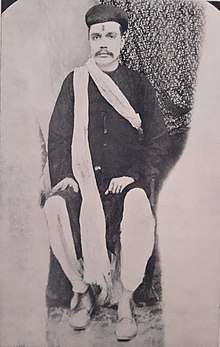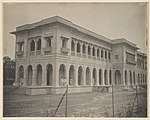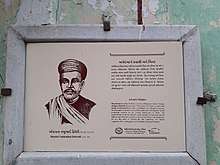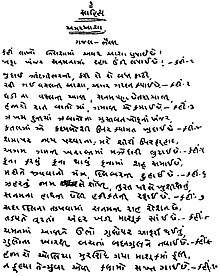Manilal Dwivedi
Manilal Nabhubhai Dwivedi (pronounced [məɲilal nəbʰubʰai dvivedi] (![]()
Manilal Dwivedi | |
|---|---|
 Manilal Dwivedi | |
| Born | Manilal Nabhubhai Dwivedi 26 September 1858 Nadiad, Bombay presidency, British India |
| Died | 1 October 1898 (aged 40) Nadiad, Bombay presidency, British India |
| Occupation | writer, poet, novelist, essayist, philosopher, editor and social reformer |
| Language | Gujarati |
| Nationality | Indian |
| Education | BA |
| Alma mater | Elphinstone College (1877–1880; Bachelor of Arts) |
| Period | Pandit Yuga |
| Notable works |
|
| Years active | 1876–1898 |
Manilal belongs to the Scholar Era of Gujarati literature during which the largely religious writings of the previous era began to make room for contemporary topics such as social welfare, Western literary genres, and new-age thinking. His main works include Atmanimajjan, a collection of poems on the theme of love in the context of advaita (non-duality) philosophy; Kanta, a play combining Sanskrit and English dramatic techniques; Nrusinhavatar, a play based on Sanskrit dramatic traditions; Pranavinimaya, a study of yoga and mysticism; and Siddhantasara, a historical critique of the world's religious philosophies. His faith in Shankara's advaita philosophy was the fundamental underpinning of his philosophical thoughts. As he held Eastern civilisation in high esteem, he resisted the influence of Western civilisation and social reform.
Manilal's private life was inconsistent with his professions: he indulged in unrestrained eroticism and promiscuous relationships. He married at the age of thirteen and had two children. Due to his visits to brothels, he contracted syphilis and, after suffering from serious bouts of illness throughout his life, died at the age of 40. Narmad, the founder of modern Gujarati literature, considered Manilal his intellectual heir. Manilal elaborated upon Narmad's line of thinking through his writings in the monthlies Priyamvada and Sudarshan, which he edited from 1885 until his death.
Biography
Manilal Nabhubhai Dwivedi was born on 26 September 1858 at Nadiad, Gujarat, to a Sathodara[upper-alpha 1] Nagar family. His father, Nabhubhai, was a moneylender and temple priest. The day after Manilal's birth, a local astrologer declared that he would have a brilliant career.[1]


Manilal completed his primary and secondary education in Nadiad. At the age of four, he began attending primary school; his dislike of arithmetic led him to be absent from that subject. He showed good progress at secondary school; he was ranked first in the annual examination of the second standard[upper-alpha 2] and won a prize. His teacher granted him promotion to the fourth standard as a special case, but Manilal was not happy with this favour and requested a demotion to the third standard. He was not proficient in Sanskrit and geometry, and failed Sanskrit in his matriculation examination in 1875. However, he was ranked second in examinations at Bombay University the following year, winning the James Taylor Prize.[2]
He joined Elphinstone College in 1877 and graduated with a bachelor of arts in history and politics in 1880. Under pressure from his father to earn a wage, he left the college and completed his master of arts studies as an autodidact. He returned to Nadiad, and in July 1880, became an assistant teacher at the government high school. In 1881, he was transferred to Bombay as a deputy education inspector of girls' schools. He joined Shamaldas College in Bhavnagar as a professor of Sanskrit in 1885 but retired in 1889 due to health problems.[3][4] From November 1892 to July 1893, he stayed at Patan, Gujarat, preparing a catalogue of more than two thousand manuscripts from Jain libraries. This resulted in the establishment of the Baroda State Archaeology Department, which he headed from December 1893 to July 1895.[3][5][6]
Manilal attended the convention of the Indian National Congress held at Bombay in 1889 as a delegate from Nadiad. He was elected as secretary of the Congress committee of Kheda district in 1890 and continued in that position for two years, and worked as its honorary magistrate for 1891 and 1892. He was nominated a member of Nadiad Municipality by the government and served as chairman of the school committee from 1891 to 1893, and was appointed examiner for Sanskrit at the BA and MA examinations of the University of Bombay and University of Punjab in 1890, 1891 and 1892.[7]
Dhirubhai Thaker, a biographer of Manilal, noted that Manilal had an impressive personality and was tall and handsome in appearance. He habitually wore a long coat, a brahmin-style dhoti, a red turban and a long loose scarf hanging over his shoulders.[8]
Personal life
At the age of 13, Manilal married Mahalaxmi, with whom he had an unhappy marriage. She gave birth to two sons, one in 1882 and the other in 1887, and separated from Manilal in 1890. Manilal had an obsession for love and formed close relationships with several women. As Thaker noted in his biography of Manilal, not all of these relationships were platonic: in several cases, Manilal tried to satisfy his sexual desires under the pretext of being in love. While he was in Bombay, he fell in love with the wife of an acquaintance, and composed poems addressed to her in a variety of moods. Another affair was with Diwalibai, a teacher in a Bombay girls' school, Manilal initially rejected her but she persisted, sending him a series of love letters, and he agreed to respond to her love, though refraining from a sexual relationship.[9] Diwali's letters were first published by Ambalal Purani in the November 1936 issue of Kaumudi, a Gujarati monthly. They were reproduced in Manilal's autobiography Atmavrittanta as an appendix.[10]
From 1891, Manilal began an affair with Ramlakshmi, the wife of his pupil Chhotu, which lasted two-and-a-half years. He also had a brief affair with Chhotu's mistress, Ladi.[11] In his autobiography, he admitted to having had sexual relationships with a close friend's wife, his wife's aunt, a woman seeking a job, a local woman, several prostitutes, servants, and the daughter of a close friend.[12]
At this point I will state that the main quest in my life was to find a pure locus of love. If such a locus happened to be a woman, preferably wife, so much the better. But if in the absence of a woman such an intimacy could be established with a man, that too suited my purpose. I pined for friendship only with this object in mind. In friendship I insisted that I must be the sole object of love. To me, love meant complete identity – identity that makes one forget his own self and feel exquisite pleasure in doing so. I did chance to come across some women to satisfy my thirst for love – not for sex – but I was disappointed by both – men and women, in consequence of which my love turned into longing.
Death
In his autobiography, Atmavrittanta, Manilal states that he visited brothels during his college years. As a result, he contracted syphilis, which developed into secondary and tertiary stages.[14] Manilal recorded an abscess on his neck in July 1898. In September, he developed jaundice and pleurisy. He died on the morning of 1 October 1898 while writing at his home in Nadiad.[8]
Works
Manilal's writings belong to the Pandit Yuga, an era in which Gujarati literature expanded beyond religious forms to address social welfare, Western literary genres, and new-age thinking.[15] His writing career began in 1876 with the poem Shiksha Shatak and continued until his death.[16] He contributed to almost all popular forms and published poems, plays, essays, an adaptation of an English novel, book reviews, literary criticism, research, edited works, translations, compilations, and an autobiography in manuscript form. He also wrote articles on philosophical and literary subjects, which have been collected in Sudarshan Gadyawali (1909). He was an exponent of advaita philosophy; throughout his life, he interpreted all aspects of human life and civilisation in the context of Advaita Vedanta,[3] writing several articles and books on the topic.[17]
Literary works
In 1882, Manilal published his play Kanta.[3] A fusion of Sanskrit drama and Shakespearean tragedy, the play had the first tragic hero in Gujarati drama.[18] Manilal wrote another play, Nrusinhavatar (1896), at the request of the Mumbai Gujarati Natak Company. It was based on Hindu mythological episodes, and was staged in 1899 after his death.[17]
Manilal based his poetry collection Atmanimajjan (1895) on his own circumstances, with the theme of love.[19] It largely consisted of ghazals in the style of Persian Sufis. Despite flaws of language, such as the misuse of Persian words, they were held to capture the spirit of ghazal according to critic Mansukhlal Jhaveri. Through them, Manilal illustrated the concepts of the Advaita Vedanta, and his disappointments and cravings for love were expressed. His ghazal "Amar Asha" is popular in Gujarati.[17]
He adapted Edward Bulwer-Lytton's novel Zanoni into Gujarati as Gulabsinh (1897).[20] According to Thaker, "Gulabsinh occupies an important place in Gujarati literature as a unique adaptation of an English novel, and as a novel of occult interest and a rare love-story of a human and a superhuman character."[21] It was later adapted into the Gujarati plays Prataplakshmi (1914) by Mulshankar Mulani and Siddha Satyendra (1917) by Chhotalal Rukhdev Sharma.[22][23]
His autobiography, Atmavrittanta, was published posthumously in 1979, eighty years after his death. It created a stir due to its outspoken nature and its unreserved accounts of his moral lapses.[3]
Religious and philosophical writings
Manilal's philosophical position was grounded in Advaita Vedanta, a branch of Hindu philosophy which believes that the true self, or "atman", and the highest metaphysical reality of the universe, the "brahman", are identical. Manilal made Vedantic philosophy popular among the Gujarati community, examining the main features of Indian philosophy and of Hinduism. He imparted to Gujarati readers an awareness of the foundation of their religion and culture.[24]
He believed that the philosophy of Advaita Vedanta, that the self is part of all and vice versa, can guide all human activities, and that the essence of Bhagavad Gita is the karma yoga (path of unselfish action). With this premise, he made tremendous efforts to establish the superiority of Indian culture in comparison to Western culture. He was recognised both in India and in abroad as a staunch proponent of ancient Hindu traditions and as a learned Indian philosopher.[25]
Shortly after moving to Bhavnagar, Manilal published a book in English entitled Raja Yoga (lit. 'King of all Yogas'), in 1885.[26] This reproduced a lecture he had delivered on the topic of 'The Logic of Commonsense', together with an introduction to theosophist Tookaram Tatya's English version of the Bhagavad Gita. The book also contained his English versions of the Vakyasudha and the Aparokshanubhuti. The English orientalist Edwin Arnold, who met with Manilal in Bhavnagar and conversed with him at length, admired the book for its content and clarity.[upper-alpha 3] Shortly after its publication, Manilal received a letter inviting him to speak in the 7th Oriental Congress in Vienna, which was to be held in December 1886. However, the political agent of Saurashtra decided to replace Manilal with another candidate, R. G. Bhandarkar.[27] Manilal wrote two articles for later Oriental Congresses: the first on The Purans (Philosophy verses Symbology), which was written for the 8th Oriental Congress held in Stockholm in 1889; and another on Jain philosophy for the 9th Oriental Congress held in London in 1892. He was awarded a certificate of merit for the second article.[29][30]
In order to respond to the Westernised reformist movement of his age, Manilal planned to write two books. The first, Pranavinimaya, contained practical expressions of spiritualism according to Hindu philosophy. It was written from 2 August to 9 September 1888 and published in December. It addresses mesmerism and presents a study of yoga and mysticism; it attempts to establish a similarity between mesmerism and yoga, and to establish the superiority of spiritualism over materialism.[17][31]
The second book, Siddhantasara, was a discourse on the theoretical aspects of Advaita philosophy in the context of other world religions. Manilal began writing it shortly after Pranavinimaya, though his work was delayed by illness. It was completed in March 1889 and published in June.[31] It outlines the development of Indian philosophy and makes a case for the superiority of Advaita philosophy over all other religious philosophies. It created prolonged controversy; many were particularly critical of what they regarded as logical lapses and inconsistencies in Manilal's arguments.[32]
He was invited to present a paper at the first Parliament of World Religions, held in Chicago in 1893, but he could not afford to go. His paper on Hinduism was read there by Virchand Gandhi.[33][34] Manilal wrote several books in English which were well received in India, Europe and America, including Monism or Advaitism? (1889) and Advaita Philosophy.[17] He published an anthology of the aphorisms of Vedanta under the title The Imitation of Shankara (1895), and simultaneously published its Gujarati version entitled Panchashati.[35]
Social reform and educational writings
Manilal was one of several Gujarati writers and educators, among them Narmad, Dalpatram Dahyabhai Travadi, Karsandas Mulji, Govardhanram Tripathi, Mansukhram Tripathi and Navalram Pandya, who campaigned for reforms and awareness of the problems their community was facing.[36]
During his school years, Manilal was a member of an association known as Swa-Sudharak (self-reformist). At the age of 15, he, along with his friends, started a local group of Prarthana Samaj[upper-alpha 4] in Nadiad. However, its activities did not extend beyond a small group. In Bombay, he was associated with the Gujarat Social Union, an association of Gujarati graduates. He took a keen interest in mesmerism and occultism. He came into contact with Colonel Henry Steel Olcott, the first President of the Theosophical Society, and became a member in 1882, writing a series of articles on theosophy.[37]
Around 1882, Mansukhram Suryaram Tripathi encouraged Manilal to revive the Buddhi Vardhak Sabha, a social and literary group. Thereafter, Manilal acted as its secretary and discussion on various topics took place under its auspices. Here, he came in contact with Narmad, who was much impressed by Manilal's scholarship and his writings on Indian cultural tradition. Later, Narmad, on his death-bed, expressed the hope that Manilal would carry forward the reform activities he had expounded.[38]
In 1885, Manilal founded and edited a magazine called Priyamvada to discuss the problems faced by Indian womanhood. At the time, most Gujarati women were uneducated, and the magazine did not draw the response he had hoped for from the women's community, so in 1890 he renamed it Sudarshan, and made it wider in scope.[16][39] He elaborated upon Narmad's line of thinking through his writings in these magazines which he edited until his death.[40] Sudarshan Gadyawali (1909) is a collection of his articles published in these magazines. These articles cover many subjects, such as religion, education, sociology, economics, politics, literature and music. According to Jhaveri, with these magazines, Manilal emerged as the acknowledged master of Gujarati prose. Bal Vilas (1897) is a collection of Manilal's essays on religion and morality, written for schoolgirls.[17]
Translations
Manilal translated the Sanskrit plays Malatimadhava and Uttararamacarita by Bhavabhuti into Gujarati. Of these, Uttararamacarita was considered an excellent translation by Jhaveri. He also translated Samuel Smiles's Character as Charitra (1895),[17] and Samuel Neil's Culture and Self-Culture as Shikhsna ane Svashikshan (1897) into Gujarati.[35] He translated the Bhagavad Gita with commentary into Gujarati.[31] He prepared with translation and notes the English editions of Patanjali's Yogadarshan and Mandukya Upanishad for the Theosophical Societies of India and America respectively.[29]
Controversies
Manilal's tirades against modern reformers and his message of "no surrender to the West" created a stir in Gujarati society. He criticised reformers who advocated modernity at the cost of Indian tradition. As a result, reformers such as Ramanbhai Neelkanth, who was also a writer and intellectual, spoke out against Manilal's conservatism.[41] Manilal criticised the Prarthana Samaj for importing the concept of God as a transcendental creator from Christianity, which, according to him, was "the fifth edition of Aryadharma (Indian religion)". On behalf of the Prarthana Samaj, Neelkanth entered into a seven-year dispute with Manilal on numerous topics related to religion, philosophy, social reform, education and literature. Their public debates, carried on in the pages of Manilal's Sudarashan and Neelkanth's Jnanasudha, are considered unparalleled in Gujarat's history of reflective literature.[8]
In 1884, Manilal published Nari Pratishtha in eight instalments in the weekly periodical Gujarati. In this essay, he opposed widow-marriage and argued that if a woman was correctly and morally educated, she would cultivate the temperament of not wishing to remarry should she become a widow. It was republished, with additions, in book form in 1885.[42] He entered into a public disagreement with Behramji Malabari on the issue of widow-remarriage, which continued for six months in the pages of Advocate of India and The Indian Spectator. Malabari was attempting to move the government to legislate in favour of widow-remarriage, and tried to persuade Manilal to give up his opposition to this; Manilal refused.[43]
Reception

Manilal, along with his fellow Gujarati writer Govardhanram Tripathi, significantly contributed to Gujarati literature. The period of their activity (1885–1905) is recognised as the Mani-Govardhan Era rather than by a general terms such as Sakshar Yuga or Pandit Yuga.[44] The scholar Anandshankar Dhruv publicly described Manilal as a Brahmanishtha (one who always keeps his mind fixed on the Supreme Brahman, the ultimate reality).[40] Thaker wrote a biographical play, Uncho Parvat Undi Khin (1993; 'Lofty Mountain, Cavernous Valley'), based on Manilal's life.[45]
Manilal occupies a distinctive place in Gujarati literature. Throughout his life, he struggled at both a personal and public level to live up to the practical principles he elicited from his reading of the Advaita Vedanta tradition. His vision combined an ardent advocacy of Aryan philosophy with a Hindu worldview. He endeavoured to publicise his opinions to counteract what he saw as the blind enthusiasm of his fellow Indians for Western culture. Manilal thought that the non-dualistic philosophy of Advaita Vedanta, despite its complexity, contained important values which could inspire people to lead practical lives while remaining faithful to its ideals.[40]
Mahatma Gandhi, during his first stint in gaol in South Africa in January 1908, read widely in the literature of Western writers such as Tolstoy, Thoreau and Emerson to enlarge his vision and, among the masters of Indian philosophy, he turned to Manilal's book on Raja Yoga and his commentary on Bhagavad Gita.[46]
Footnotes
- A subcaste of Nagar Brahmin Hindu caste whose ancestors belonged to a village named Sathod (near Dabhoi).
- An educational stage equivalent to grade or year.
- Arnold wrote in his book, India Revisited (1886): "Nor does Poona or Bombay contain any Shastree, with clearer conclusions on Hindu theology and philosophy, better command of lucid language, or ideas more enlightened and profound than Mr. Manilal Nabhubhai Dwivedi... whose book just published on the Raja Yoga ought to become widely known in Europe and to converse with whom has been a real privilege".[27][28]
- A movement for social and religious reform started in Bombay in 1867.
Notes
Citations
- Thaker 1983, pp. 14–15.
- Thaker 1983, pp. 15–16.
- Datta 1988, pp. 1130–1131.
- Topiwala, Soni & Dave 1990, p. 268.
- Yashaschandra 1995, p. 50.
- Thaker 1983, p. 32.
- Thaker 1983, p. 33.
- Thaker 1983, p. 38.
- Thaker 1983, pp. 33–36.
- Suhrud 1999, p. 193.
- Suhrud 1999, pp. 125–127.
- Suhrud 1999, p. 188.
- Suhrud 1999, p. 102.
- Thaker 1983, p. 19.
- Desai 2011, pp. 385–386.
- Chavda 1980, p. 733.
- Jhaveri 1978, pp. 101–104.
- George 1992, p. 126.
- Topiwala, Soni & Dave 1990, p. 23.
- Choudhuri 2016, p. 2267.
- Thaker 1983, p. 70.
- Choksi & Somani 2004, p. 117.
- Choksi & Somani 2004, p. 124.
- Thaker 1983, pp. 13–14.
- Thaker & Desai 2007, pp. 355–356.
- Birch 2013, p. 407.
- Thaker 1983, p. 25.
- Arnold 1886, p. 106.
- Thaker 1983, p. 30.
- Thaker 1983, p. 46.
- Thaker 1983, p. 29.
- Thaker 1983, pp. 45–47.
- Chattopadhyaya 1999, p. 418.
- Thaker 1983, p. 31.
- Thaker 1983, p. 37.
- Pandya 2004, p. 16.
- Raval 1987, pp. 198–199.
- Raval 1987, p. 199.
- Dalal 1999, p. 9–10.
- Patel 2000, pp. 38–39.
- Ray 1981, p. 382.
- Raval 1987, p. 202.
- Thaker 1983, p. 26.
- Thaker 1983, p. 54.
- Desai 2002, p. 69.
- Parel 1997, p. 6.
Sources
- Arnold, Edwin (1886). "A Model Native State". India Revisited. Boston: Roberts Brothers. pp. 99–116.
- Birch, Jason (December 2013). "Rājayoga: The Reincarnations of the King of All Yogas". International Journal of Hindu Studies. 17 (3): 399–442. JSTOR 24713650.

- Chattopadhyaya, Rajagopal (1999). Swami Vivekananda in India: A Corrective Biography. Delhi: Motilal Banarsidass Publishers. p. 418. ISBN 978-81-208-1586-5.
- Chavda, Vijay Singh (1980). "The 19th Century Social Reform in Gujarat: A Contemporary Evaluation". Proceedings of the Indian History Congress. 41: 733. JSTOR 44141900.

- Choksi, Mahesh; Somani, Dhirendra, eds. (2004). Gujarati Rangbhoomi: Riddhi Ane Ronak ગુજરાતી રંગભૂમિ: રિદ્ધિ અને રોનક [Compilation of Information regarding professional theatre of Gujarat] (in Gujarati). Ahmedabad: Gujarat Vishwakosh Trust. pp. 117, 124. OCLC 55679037.
- Choudhuri, Indra Nath, ed. (2016). Encyclopaedia of Indian Literature: I-L. Volume 3. New Delhi: Sahitya Akademi. p. 2267. ISBN 978-81-260-4758-1.
- Dalal, Yasin (1999). Princes And the Press. Rajkot: Saurashtra University. OCLC 82772563.
- Datta, Amaresh, ed. (1988). Encyclopaedia of Indian Literature: Devraj to Jyoti. Vol.2. New Delhi: Sahitya Akademi. pp. 1130–1131. ISBN 978-81-260-1194-0.
- Desai, Rakesh, ed. (2011). Society and Literature: Narmad in Critical Discourse. Surat: Veer Narmad South Gujarat University. pp. 385–386. ISBN 978-81-921045-0-8.
- Desai, S.D. (2002). More Happenings: Gujarati Theatre Today (1990 – 1999). Gandhinagar: Gujarat Sahitya Academy. p. 69. ISBN 81-7227-113-1.
- George, K. M., ed. (1992). Modern Indian Literature, an Anthology: Surveys and Poems. New Delhi: Sahitya Akademi. p. 126. ISBN 978-81-7201-324-0.
- Jhaveri, Mansukhlal (1978). History of Gujarati Literature. New Delhi: Sahitya Akademi. pp. 101–104. OCLC 639128528.
- Pandya, Ketki N. (2004). Tagore's Chitra and Aurobindo's Savitri: A Comparative Study. New Delhi: Atlantic Publishers. ISBN 978-8-126-90353-5.
- Parel, Anthony J. (1997). "Introduction". Gandhi: 'Hind Swaraj' and Other Writings. New York: Cambridge University Press. pp. xiii–lxii. ISBN 978-0-521-57405-1.
- Patel, C. N. (2000). Moral and Social Thinking In Modern Gujarat. Gandhinagar: Gujarat Sahitya Akademi. pp. 38–39. OCLC 297205718.
- Raval, R. L. (1987). "Reform Controversy and New Approach to Cultural Synthesis". Socio-Religious Reform Movements in Gujarat During the Nineteenth Century. New Delhi: Ess Ess Publications. pp. 185–232. OCLC 838404380.
- Ray, N. R., ed. (1981). Western Colonial Policy: A Study on its Impact on Indian Society. Volume 1. Culcutta: Institute of Historical Studies. p. 382. OCLC 916707731.
- Suhrud, Tridip (1999). "Love, Desire and Moksha: Manibhai Nabhubhai and the Loss of Svadharma" (PDF). Narrations of a Nation: Explorations Through Intellectual Biographies (Ph.D thesis). Ahmedabad: School of Social Sciences, Gujarat University. hdl:10603/46631.
- Thaker, Dhirubhai (1983). Manilal Dwivedi. Makers of Indian Literature. New Delhi: Sahitya Akademi. OCLC 10532609.
- Thaker, Dhirubhai; Desai, Kumarpal, eds. (2007). Gujarat: A Panorama of Heritage of the Gujarat. Ahmedabad: Gujarat Vishwakosh Trust. p. 355–356. OCLC 180581353.
- Topiwala, Chandrakant; Soni, Raman; Dave, Ramesh R., eds. (1990). Gujarati Sahitya Kosh : Arvachinkal ગુજરાતી સાહિત્ય કોશ : અર્વાચીનકાળ [Encyclopedia of Gujarati Literature : Modern Era] (in Gujarati). II. Ahmedabad: Gujarati Sahitya Parishad. OCLC 26636333.
- Yashaschandra, Sitanshu (October–December 1995). "Towards Hind Svarāj: An Interpretation of the Rise of Prose in Nineteenth-Century Gujarati". Social Scientist. 23 (10/12): 50. JSTOR 3517882.

Further reading
- Purani, Ambalal (1951). Maṇilāla Nabhubhāī Dwivedīnuṃ Jīvanacaritra મણિલાલ નભુભાઈ દ્વિવેદીનું જીવનચરિત્ર [Biography of Manilal Nabhubhai Dwivedi] (in Gujarati). Ahmedabad: Gujarat Vidhya Sabha. OCLC 35740385.
- Thaker, Dhirubhai (1956). Manilāla Nabhubhāi: Sāhityasādhana મણિલાલ નભુભાઇ: સાહિત્ય સાધના [Works of Manilal Nabhubhai] (in Gujarati). Ahmedabad: Gurjar Grantharatna Karyalay. OCLC 80129512.
External links
| Wikimedia Commons has media related to Manilal Dwivedi. |
| Gujarati Wikisource has original text related to this article: |

